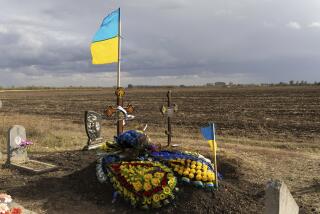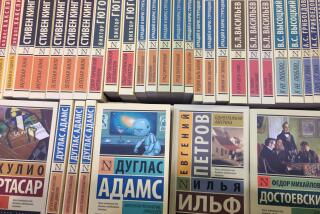COLUMN LEFT / RUTH ROSEN : Splintered Politics, East and West : As the Soviet republics break away, we secede into our own ethnic and cultural blocs.
- Share via
Sometimes, I tell my students, history speeds up, events spin out of control and time takes on a different dimension. Such has been the world’s experience as a failed coup in the Soviet Union ignited the collapse of the Communist Party’s 70-year rule over the Soviet empire.
It is at such moments that the pundits and talking heads weigh in, predicting scenarios, trying to control what is, after all, the untidiness of history. It can’t be done. All we can do is try to envision the broader patterns that may become clearly evident to historians in the 21st Century.
Whatever the future form of the Soviet Union, the dissolution of nation-states into their constituent parts has gained worldwide momentum. The Soviet republics’ frenzied march toward independence is part of a larger global retreat. As in Yugoslavia, people are fleeing political states created within the last century and searching for national identities.
The nation-state no longer appears to serve the economic, political and spiritual needs of much of the world’s population. As a global economy and mass communications create greater interdependence, people cling to ethnic identities and fundamentalist religions that seem to offer cultural and spiritual refuge from the dehumanizing, technocratic and bureaucratic life in both communist and capitalist societies.
The United States has not escaped these global tendencies. Here, too, the center no longer holds. Unlike in the Soviet Union, people are not seceding into smaller political states. Rather, they are dissolving into racial and ethnic cultural communities. Sometimes, as in the recent clashes between blacks and Hasidic Jews in the Crown Heights section of Brooklyn, violence erupts and the mood turns downright ugly.
Czechoslovakia’s Vaclav Havel, who loves to point out the paradoxes that plague humankind, would smile at the fact that group solidarity--which is necessary to advance the needs of minorities--also shreds loyalties to the whole. Ethnic, racial and gender politics, on the rise for two decades in the United States, have achieved many protections and rights for different American populations. But identity politics, by it very nature, does not strengthen group ties to the whole. As journalist E.J. Dionne Jr. observes in his new book, “Why Americans Hate Politics,” Americans have not only lost interest in politics, they have ceased to search for common ground. National politics, waged in symbols and sound bites, has lost the interest of the governed.
Historian Christopher Lasch may be right that the left and right are disappearing as viable political categories. (But then again, it is said that only people on the left say such things.) Lasch argues that the idea of progress, that cornerstone of Western thought, is myth. Both communism and capitalism are about infinite consumption; neither challenges the exhaustion of nonrenewable resources, the irreversible pollution of Earth’s atmosphere and the destruction of the ecological system on which life depends.
Recent events offer support for Lasch’s argument. In some Soviet republics, it is members of the Communist Party who opportunistically have declared independence from the Soviet Union. As the empire disintegrates, they rush to grab political and economic control of smaller fiefdoms.
In the United States, what is left of the Left eschews universal claims, the idea of a common culture and embraces the politics of difference. Meanwhile, what is left of the Right disingenuously embraces what it calls “universal values,” which actually conceal the defense of its own economic privilege.
Americans watch the disintegration of the Soviet Union with awe, and rightly so. A world without a Cold War and two superpowers was unimaginable a decade ago. Meanwhile, a different kind of political disintegration is taking place within our own country. The Persian Gulf War only postponed America’s real identity crisis.
More to Read
Sign up for Essential California
The most important California stories and recommendations in your inbox every morning.
You may occasionally receive promotional content from the Los Angeles Times.










